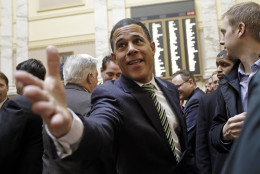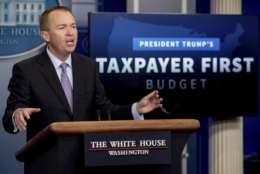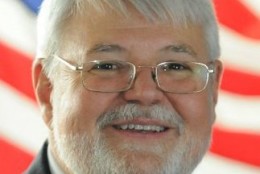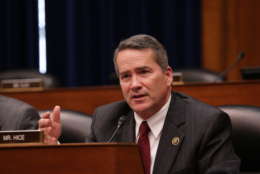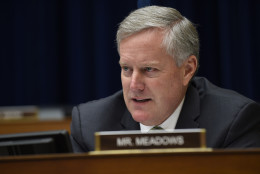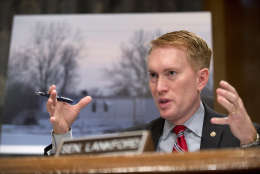J. David Cox
-
Rep. Anthony Brown (D-Md.) introduced the Federal Employee Pension Act of 2017 to reduce the mandatory 4.4 percent pension contributions by new federal employees.
July 18, 2017 -
A 2018 budget proposal from the House Budget Committee asks federal employees to contribute more toward their retirement as a way to find $203 billion in mandatory spending cuts next year.
July 18, 2017 -
Democrats and Republicans voiced their concern that EPA's 31 percent cut in funding for fiscal 2018 could do more harm than good, and leave states "holding the bag" for the federal agency.
June 15, 2017 -
The President's full 2018 budget proposal offers a 1.9 percent pay raise for civilian employees and a 2.1 percent raise to members of the military. But federal employee unions and organizations say the raise does little to undo the damage the President's proposed cuts to federal retirement benefits will have on current employees and retirees and future government workers. The budget also details workforce reductions at some agencies.
May 23, 2017 -
It's been an interesting year for federal employee union, first a hiring freeze. and then a renewed attempt in the Senate to change the terms of employment at the Veterans Affairs Department. Now the House has turned its attention to civil service reform. J. David Cox, national president of the American Federation of Government Employees, joins Federal Drive with Tom Temin for one union's view.
May 23, 2017 -
Both the Veterans Affairs and Justice departments believe they can easily resolve some concerns with the constitutionality of the VA Accountability and Whistleblower Protection. DoJ is concerned, however, that VA will run into the same issues that ultimately rendered a controversial provision on firing senior executives unconstitutional.
May 18, 2017 -
Federal employees with a high school diploma or less earn 53 percent more in total compensation than their counterparts in the private sector, while federal workers with a bachelor's degree earn 21 percent more, according to a new report from the Congressional Budget Office. In contrast, federal employees with a professional degree or doctorate earn 18 percent less than their counterparts in the private sector.
April 26, 2017 -
Congress has been criticized for kicking the can down the road when it comes to federal spending, but as the government shutdown clocks ticks closer to midnight — and agencies dust off their contingency plans — some are wondering if that kicked can might be the best option right now.
April 21, 2017 -
Linda Springer, a senior adviser at the Office of Management and Budget, said in part 2 of her exclusive interview about the Trump administration’s reorganization plans that the White House wants to give agencies a lot of freedom in how they execute their plans.
April 21, 2017 -
The Office of Personnel Management recently released a long-awaited report on official time for fiscal 2014. It found agencies used slightly more official time that year than fiscal 2012, the last time OPM completed a governmentwide report on the topic. The report's release comes as Congress looks to limit federal employees' official time use.
March 27, 2017 -
DoD analysts and former officials are recommending direct hiring and pay authority over civilian Pentagon workers.
March 24, 2017 -
President Donald Trump offered a first look at his upcoming management agenda in the 2018 budget blueprint. The agenda will focus on eliminating agency reporting requirements on IT, acquisition, human capital and real property and letting "managers manage." It also suggests the budget and reorganization executive order initiatives will drive future agency workforce cuts.
March 16, 2017 -
Two lawmakers have introduced legislation that would leverage pensions and benefits in an effort to reign in use of official time and has resulted in hours of debate and a deeper divide over the subject of unions.
March 09, 2017 -
A recent Government Accountability Office report on the Veterans Affairs Department and its employees' use of official time is renewing a debate among lawmakers: Does official time have a place within agency operations, and how much time is too much?
February 16, 2017 -
The Senate Homeland Security and Governmental Affairs' federal workforce subcommittee said it's on a fact-finding mission this year. Subcommittee Chairman James Lankford (R-Okla.) said he wants to hear from federal managers about the existing authorities and processes that make their jobs more difficult.
February 09, 2017

